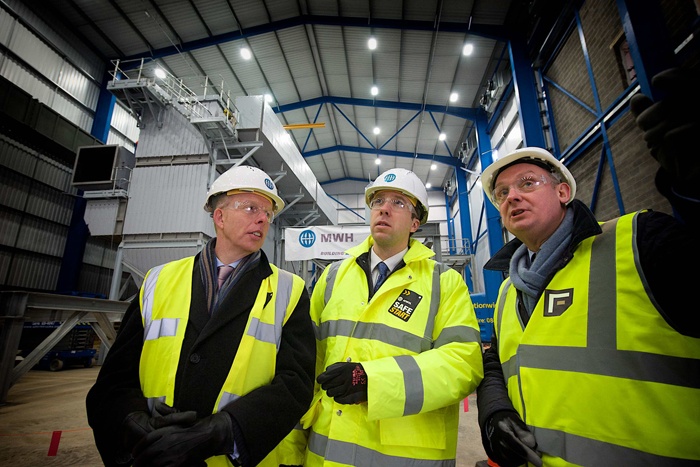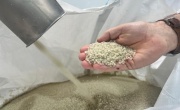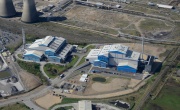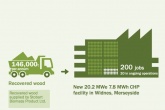GIB launches £50m bioeconomy fund
The UK Green Investment Bank (GIB) has announced today (2 February) that it is launching a £50-million fund for ‘smaller-scale, innovative’ recycling and waste projects across the UK.
Targeting ‘biopower’ projects, such as biomass facilties that burn waste wood for electricity production, the Recycling and Waste LP (RAW) fund will be managed by Foresight Group LLP (Foresight) and will raise ‘at least a further £50 million’ from private-sector co-investors to match GIB’s investment.
The RAW fund builds on GIB’s UK Waste Resources and Energy Investments (UKWREI), which has now fully-committed its funding to seven waste and recycling projects:
- Birmingham BioPower Limited’s biomass plant in Tyseley, Birmingham;
- East London Biogas Limited’s anaerobic digestion and in-vessel composting facility in Dagenham, Essex;
- Evermore Renewable Energy’s biomass plant in Derry/Londonderry Port, Northern Ireland;
- PAR Renewables and BRIDGE Energy’s, on-farm anaerobic digestion plants in County Tyrone and County Down, Northern Ireland;
- Willen Biogas’s anaerobic digestion facility in Enfield, North London; and
- Mersey BioEnergy Limited’s biomass plant in Merseyside.
Although details of the RAW fund have yet to be released, it has been revealed that the fund already has ‘an extensive pipeline in place’.
Announcing the fund this afternoon, Business, Enterprise and Energy Minister, Matthew Hancock MP, who is also joint Ministerial Champion for the Bioeconomy, stated that the investment could help “put the UK at the forefront of this innovative green technology”.
Nigel Aitchison, Partner and Head of Environmental at Foresight said that the fund would help “continue the momentum of investment in this important element of the infrastructure sector”.
Biomass plants have been a source of contention in the UK, after the RSPB, Friends of the Earth and Greenpeace, warned that burning virgin biomass stock, such as whole trees, can be ‘dirtier than coal’. Indeed, environmental groups have targeted protests at GIB already for investing almost £200 million in ‘dirty’ energy projects in 2014, expressing specific concerns about the funding of large-scale biomass plants and waste incinerators.
However, the Department of Energy & Climate Change’s ‘Renewables Roadmap’ estimates that by 2020, biomass could potentially provide between 26 and 42 per cent of renewable energy in the UK, and government expects to provide a subsidy for biomass of between £442 million and £736 million.
Birmingham BioPower plant

The news of the RAW fund came as Hancock toured the site of a new £47-million biomass facility, currently under construction in Tyseley, Birmingham.
The project – which is located on the Webster and Horsfall site in Birmingham – has been developed by Carbonarius (a joint venture between energy company O-Gen UK and UNA Group, ‘a diversified range of businesses’, including some that reprocess rubber, wood and plastic) and will be built and operated by MWH Treatment under the name Birmingham Bio Power Ltd (BBPL).
Expected to be the ‘first of its kind in the UK’ once operational in ‘early 2016’, the facility will divert 67,000 tonnes of waste wood (supplied by local business, JM Envirofueld Ltd) from landfill every year by gasifying it to produce 10.3 megawatts of electricity.
It is expected that over a 20-year lifetime, the plant will produce enough renewable energy to power 17,000 homes a year, reduce greenhouse gas emissions by ‘around 2.1 million tonnes of carbon dioxide equivalent’, and divert around 1.3 million tonnes of wood from landfill.
‘First time this technology will be used in the UK’
After his tour of the site, Hancock commented: “This state-of the-art plant in Birmingham will be the first of its kind in the UK. It uses a new type of gasification system and will not only power 17,000 homes and recycle waste more efficiently but will also boost the local economy and create 100 local jobs.”
As well as the 100 engineering, construction and project management jobs, the project is expected to create 19 full-time jobs once operational.
Shaun Kingsbury, Chief Executive of GIB, said: “This new facility is a great example of the modern, advanced-technology infrastructure we need to see across the UK. It’s the first time this technology will be used in the UK and the investment will benefit the local economy, with a local small business supplying the plant with wood that would have otherwise gone to landfill. We were delighted to provide the finance that allowed the project to go ahead.”
This new fund will be GIB’s second investment in a Foresight-managed fund. The first fund – UK Waste Resources and Energy Investments (UKWREI) – was GIB’s first investment upon becoming operational in 2012. UKWREI has supported projects including Birmingham Bio Power, as well as small-scale on-farm anaerobic digestion plants in rural Northern Ireland, powering 850 homes.
Green Investment Bank background
Thought to be the ‘first bank of its kind in the world’, GIB was launched in November 2012 to support environmentally-friendly projects that cannot obtain sufficient funding from the markets.
It is a ‘for profit’ bank, whose mission is to ‘accelerate the UK's transition to a greener economy’, further efforts to meet the UK's 2020 target of reducing carbon emissions, and ‘create an enduring institution, operating independently of government’.
As outlined by the European Commission, GIB can make investments on ‘commercial terms’ in the following sectors:
- offshore wind;
- waste (treatment and recycling and energy from waste);
- non-domestic energy efficiency;
- biofuels for transport;
- biomass power;
- carbon capture and storage;
- marine energy; and
- renewable heat.
Find out more about the Green Investment Bank or the Birmingham Bio Power plant.








